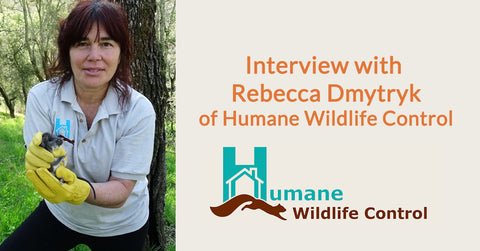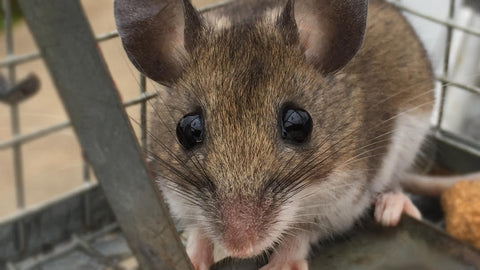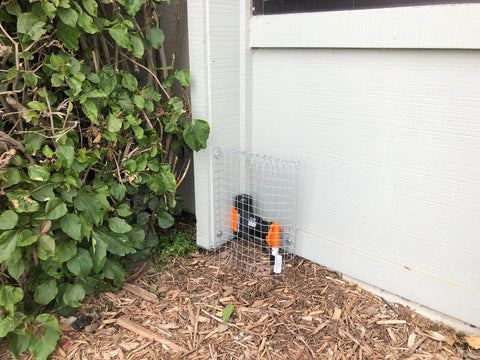
Interview With Rebecca Dmytryk of Humane Wildlife Control

Recently we caught up with Rebecca Dmytryk from Humane Wildlife Control to chat about the industry, the A24 and some of the modern challenges with pest control. Humane Wildlife Control is a pest control operator with a difference. They're one of under 20 service providers in the country that exclusively offer humane dispatch methods. They operate across California from the central coast to the Greater Bay Area as well as the greater Los Angeles area.
AT: So first of all, thanks to Rebecca for joining us today. Can you start off by sharing with us a bit more about yourself and your company, Humane Wildlife Control, as well?
RD: Yeah, sure. Well, I started out about 35 years ago in the wildlife rescue and rehabilitation industry, if you will. And we were more of a paramedic service. So we had to go out in the field and capture wildlife. And to do that we had to understand the species, their different characteristics and sometimes even the individuals, their personalities in order to be successful, to capture them. And so through that experience, and people coming to us with their wildlife problems, we got more and more calls, animals in traps, problem animals. And so we expanded the work that we did to include, if you will, nuisance wildlife. So that's how I got into this field. And that's where I focus most of my attention now, is in resolving as humanely as possible and long term as possible, resolving wildlife conflicts.
AT: Right. So can you expand a little bit about humane wildlife control? You know, what you guys are about as a company and you know how, how you got started with the company.
RD: So yeah, I got into this business, it kind of evolved out of my rescue service where we were just getting so many calls to help people with more of the wildlife conflicts. And yeah, again, that's where I spend most of my time right now in the... To the right audience, which I hope this is, I'll describe our work as holistic. We go out to solve a wildlife problem, whether it's a mouse or a mountain lion, we're looking to solve the problem long term. So we have to look at the whole picture, everything that's contributing to the conflict. And so we try to find the solutions that are going to be lasting and the most humane and the least invasive on the whole property. It's similar to biodynamics in the sense that we look at the person's home, their yard, the vegetation, and the wildlife as a functioning system. And there may be a need for a little tweaking here and there and maybe a little shift in perspective of the human to achieve this balance, but that's our end goal, is to find balance and to not be so intrusive into the environment because it's gotta be harmony. That's what we're looking for really.

AT: Right. And I think California is the perfect place for that, but it also presents a variety of challenges for pest control. Can you explain some of those to us? Do you find that you're really at home in California with your niche market?
RD: Yeah. So I think California is unique in — especially along the coast, it seems really unique in kind of leading the way in reducing the use of pesticides and rodenticides and things like that and people seek us out and I love it. I love it when I get those calls from people who are looking for me rather than having to convince somebody this wants me to just kill it because I'm really going to push back on that. Even though there are some situations, you know, we try and be humane, right, in what we do and we try and work within the ecosystems and stuff. But that doesn't mean that we're going to be non-lethal. Non-lethal is optimal, there are going to be those situations where we have to put some lethal controls in and that's where the A24 comes in, it's humane, it's effective, and it's easy to use and you don't have to keep setting it all the time. I love that about this trap.
AT: Why is it so important for your company to dispatch of animals or in some cases referred to as pests, humanely?
RD: Why? I mean, it's just we have to. I wouldn't think of it any other way. There's no other choice for me or the people that work with me. It's got to be humane. It's gotta be... It's what we are, you know, human, humane. It's the right thing to do. When we have to take these animals lives, we have to do it with respect, I think. And that has to be... That's gotta be important. It is important to us.
AT: Absolutely.
RD: And that's what we're going to offer.
AT: That's it. Exactly how we stand on it. And the other, just to add in a little side note there, it's when we say it dispatches of a rat humanely and somebody says, "Oh, well why would you want to be humane with a rat?" It makes you really question why would you not want to be right? I mean...
RD: Exactly. And the traps are great. When I have to explain it to people, they don't really... They want to understand it clearly. So I just say, "It's like a captive bolt. It's how we humanely dispatch cattle. Actually, I was talking with somebody the other day at... I was talking with a guy that runs one of the shelters and I mentioned it and he, right on, right away, he clicked, it's, "Oh, captive bolt." And said, "Oh, that's great." I go, "Yes, it's quick." And one of the other things I mentioned earlier is you don't have to go reset it and you can check your traps as often as you want, but there are ways so that you don't have to go check these traps. And they work continuously.
AT: When somebody asks me how does it work, one of the first questions I always ask them is if they've seen No Country for Old Men, and then I'd say the captive bolt system, because you know a lot of people wouldn't just know that by name, but that's exactly what it is, right?
RD: Yeah, absolutely ingenious. Well done.
AT: I cannot take the credit, but I very much appreciate the accolades. What is the most common animal that your team is dealing with?
RD: Yes. So, while we deal with pretty much everything, like I said, the majority of calls, I guess, are about mice and rats, the most misunderstood of them all perhaps and the ones that instill a bit of terror in some people. But when they... After talking to me, I think a lot of people calm down a bit. I go, "Remember, Mickey Mouse and the mouse or rat is a little pal when you were a kid and they're so cute.” And I get people to see the lighter side. I get them, I get them to rethink all the junk that they've heard, fear-mongering, there's so much out there, and to treat these guys with more compassion, that they're living creatures and born that way.
AT: They're survivors really.
RD: They're so smart. They're so incredibly smart and we use that intelligence to resolve the problems that people are having with them. Most of the work that we do involves exclusion, but there's times when a lot of my clients, not that many, but a few I guess, they need or they feel the need or want to also have lethal control.
RD: Lethal control is your last option. It's the last thing you want to do because the animals aren't the problem. Their presence is a symptom. The problem is they're getting into something, whether it's a house or a garden or a chicken coop, and you need to resolve that. Their access to whatever it is that you want to protect, maybe even a vehicle. So, lethal control is not really going to do anything until you solve that problem. How they're getting into whatever you want to protect, but some people still want to have that little security blanket or whatever. They feel compelled to have some lethal control. And so what we do is come in and say, "Okay, well let's... This is the most humane and it's not going to hurt the environment." My goal is to, again, be sensitive to the-
AT: Harmony...
RD: Yeah, and in harmony and no poisons ever. Never. And this takes the place of it. So now I can offer my clients who want lethal control, who think they have to have it. Okay, then let me bring in this. And they're great with it. The other day I took out about six bait stations and replaced them with the A24s.
AT: Wow. That's great to hear. So what does your team... I mean, you have mentioned it, but what is it your team like about or yourself like about using Goodnature products?
RD: Yeah, I think it's that we can offer clients that really feel they need to have the lethal control, we can offer them this tool that's humane, eliminates the need for poisons and you don't have to check it all the time. It's not like a snap trap, which I don't consider.
AT: Yeah. It's not really a humane option, right? Snap traps.
RD: The glue traps are horrible.
AT: Can you tell us a bit about how would your team use a Goodnature product in the field? What would your kind of set up be?
RD: Yeah, great. Thank you for asking that. Because again, lethal control, when we're talking about using these traps, it's usually outside of something. It's going to be outside of a house, outside of a building, outside of a chicken coop. It's not going to be inside because we are going to apply rodent proofing. Right? So, outside in the environment, you want to protect everybody else, the raccoons, the skunks, anything and the... For people who are listening, the a24 is kind of like this tube that faces down with an opening towards the ground and the animal sticks its head up to sniff the bait. Well, you don't want a raccoon to stick its hand up there, so what we do is we apply a little fence, little garden fencing around it so that the rodents can get in very easily and it doesn't impair that access for them, but the raccoons and other animals cannot. And that's how we set it up.

AT: I've seen pictures of this, it's really clever. So we have a product like that called The Blocker, which is on a smaller scale. We've never had a reported incident of a pet or anything or a child getting up in there. But it's just that safety blanket, a little bit more peace of mind. But I've seen how your team's applied it and it's really, I gotta give you props, it's quite a smart application for the trap.
RD: Thanks, thanks. Yeah. We wanted to make it, you know... Rats are so smart and they are neophobic. They're scared of new things. And we wanted this... Where we were putting it was at a recycling place. And we wanted to make it so that the animals were comfortable. The rats were comfortable going into this area. So you have to... They feel what their whiskers, so you want to make the opening wide enough that their whiskers don't touch or that they don't feel confined, claustrophobic. And so they'll go in readily and go into the area where the trap is, but nothing else can reach it. So if you think that way, if you think about the animals, the way they're perceiving it, you'll be really successful.
RD: We've also, we tried putting them in the five-gallon buckets that with a screw-top through the lid and that worked, that has worked really well. It probably would work better. They just had, like you were saying, they had too much food other places, so why go into this bucket? But it did work really nicely and you could rinse it out. If the animal was in there and you wanted a fresh start, you could rinse it out. So, the five-gallon bucket with a hole cut in the bottom at the very base or a couple of holes cut in the base. And then the A24 sits inside. You can just carry it around and put it wherever you want. Nobody can see what's inside it. And it's nice and clean and it works great.
Setting an A24 in protective housing from Humane Wildlife Control Inc. on Vimeo.
AT: Can you tell us a little bit about your nonprofit Wild Emergency Services?
RD: Yeah, Wildlife Emergency Services is kind of the paramedic side of the work that we do. So we go out and we respond to calls for animals in distress and we pick them up just like a paramedic. We'll go out, we'll capture them, give them first aid as needed, and then transport them to the local wildlife hospital. That's what we do. We also do a lot of testing of rodenticide victims and get their livers tested so that we... We've spent a lot of money this year on doing that.
AT: Is there a certain animal that you do more testing on for the rodenticides or is it just kind of all across the board?
RD: Bobcats — bobcat. These cats are just... So royal and they're just top of the food chain and they look at a human, they're not going to hurt a person, they don't hurt people. And to see the kind of cocky and stuff, and then to see them just skin and bones dying from rat poison. It breaks my heart. I mean, I've captured many, many, many, many sick and dying bobcats and we've taken the time to get them to the hospital and the work that goes into trying to save them at the hospital, just for them to die, and we test their liver and every single one of them really has come back with different rodenticides, rat poison. Rat poison, ground squirrel poison, gopher poison.

One of many bobcats that dies as a result of exposure to rodenticides. Photo Credit: Michael Bolte
RD: And fortunately, there's a bill that's going through the committees and-
AT: 1788?
RD: Yeah, 1788 and we hope that it gets passed. Even if it does, it allows for use in agriculture and "emergency situations". The pushback from the pest control industry, I really don't understand because my company makes a ton of money, really comfortable living providing environmentally sound, rodent control services and the pushback is unnecessary. I think it's all about money. It's all about greed. How easy it is for somebody, for these pest control operators to go out and just place bait stations outside of buildings and collect their monthly income. It's not needed. Just do some great exclusion work and if you have to do a kill if you have to have a kill solution, use the A24.
AT: Yeah, that's exactly how we feel and the bill, successful or not in it, it looks like... We're optimistic at this point, but it's really... This issue is on the front lines now and it's becoming a little bit more mainstream and people are just... Even just if it's an acknowledgment or an awareness play, I think things will really start to change in the next couple of years.
RD: I do too. I see it already. Yeah, it's good. It's hopeful.
AT: Yeah, exactly. Well, we really appreciate you taking your time to talk with us. Lastly, we just want to know what's next for humane wildlife control and where can people find you online.
RD: Oh, well, great. Thank you. Yeah, we're doing really well, maybe expanding, but people can find us online at humanecontrol.com and if they're out of our area, they can find someone, one of those 20 or so people that do exclusively humane solutions. You can find them through our trade association. Similar name, humanewildlifecontrol.org.
AT: Excellent. And any anywhere on social media where people can find you or, or Humane Wildlife control?
RD: Yeah, just www.humanecontrol.com is our business and through there you can get the links too. We have Facebook etc...
AT: Perfect.
RD: Okay?
AT: Well, we really appreciate you talking to us and we'll chat again in the future.
RD: Great. It was great. Thank you so much.
- Choosing a selection results in a full page refresh.
!

